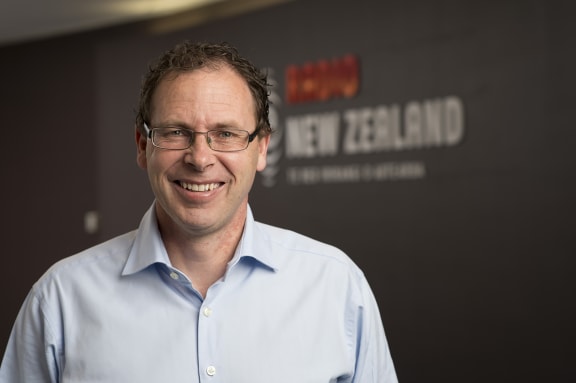One of the things I have noticed in my 18 months working at Radio New Zealand is that broadcasting policy receives little attention.
No political party made it a focus at last year's election. Few voters seemed up in arms about it.
And, as far as I'm aware, there is little fresh thinking under way in political or public service circles about the pressures faced by all news media outlets and what that means for the quality of information provided to New Zealanders.

RNZ CEO Paul Thompson Photo: RNZ
So it is pleasing to see broadcasting finally get its moment in the sun in the wake of Mediaworks' decision to review the Campbell Live programme.
Suddenly petitions have been launched to save the embattled programme.
There has been handwringing and fevered discussion and politicians of all stripes have waded in.
Labour's broadcasting spokesperson Clare Curran expressed deep concern and said: "We must not let any voice for injustice, accountability and inequality be scrapped."
Prime Minister John Key suggested Campbell Live was not entertaining enough and that, in any event, New Zealanders no longer turn to the telly for their news and information.
The attention and contention are welcome - media and broadcasting policies are important and deserve scrutiny - but some perspective is required.
The real problem is not the likely demise of a crusading TV programme fronted by a passionate journalist which is losing a ratings war.
Broadcasters and programmes - and styles of programming - will always come and go in the cut-throat world of New Zealand commercial broadcasting.
Instead, attention should focus on the seismic change that is shaking every media organisation, particularly those which rely on advertising revenue.
Campbell Live's vulnerability is a symptom of a wider struggle.
Advertising revenues across all forms of media are under duress as audiences revel in the choice, freedom and ease of access and interaction provided by the web.
Those revenues are what supported traditional media outlets and helped them fund the newsrooms that provided the journalism that in the past was a magnet for audiences. That virtuous circle is in decay and organisations such as Mediaworks are acting rationally in seeking a new formula to sustain their commercial performance.
All media outlets are trying their best to adapt, even if that means large and durable businesses are being replaced by smaller more vulnerable ones.
For our part, Radio New Zealand is in a process of renewal as we look to ensure we are as strong online as we are on-air.
The underlying issue is understanding the impact of this upheaval on the quality, range and depth of journalism.
It is a mixed picture. In many ways this is a golden age for journalism as the craft unleashes the story-telling and interactive potency of the web.
In time forms of innovation will emerge that fuse this potency with robust business models. But that is way off yet and in the meantime journalism is in choppy waters.
This matters. Credible journalism is as fundamental as air and water to a functioning democracy and it costs money to produce.
It is quite distinct from other forms of content that masquerade as journalism - the advertorial, PR spin and commercially and politically-infused material that at times threaten to take over our news feeds.
New Zealand has benefited for decades from a lively and wonderfully discordant news media sector that has provided choice and a range of views and styles.
That will continue but the news offerings are likely to be thinner in future.
Which brings me back to the role of broadcasting policy, and specifically Radio New Zealand, in this changing world.
Radio New Zealand plays a privileged and pivotal role in that we are publicly funded to provide credible, independent news, current affairs and cultural programming that are insulated from the commercial pressures that beset the wider news industry.
We have always played this important role and the events and trends which are currently the focus of such concern means we have an even more crucial part to play in future.
Radio New Zealand, the country's last remaining public service media organisation, is determined to be a positive force in this new era. We will continue to provide comprehensive, searching journalism and to get it to as many people as possible.
A recent example of this was the agenda-setting reporting last year by our economics correspondent Patrick O'Meara on zero-hour employment contracts.
Campbell Live took up the story with gusto, building on Patrick's investigative journalism. This is how it should be. Every healthy, pluralist democracy feeds off a lively, competitive media ecosystem that provides citizens with a range of information and contrasting perspectives.
Radio New Zealand's purpose is to help keep that ecosystem functioning by providing a distinct choice based on accurate and fearlessly independent news and current affairs. We would also like to encourage an on-going, more nuanced conversation about the future of the news media.
It is no longer sufficient to look in isolation at radio, television, online and print and to think it is possible to shore up the old models which are under such strain.
A new, converged world is emerging, one in which audiences are in command, and that requires new thinking.
Please send any comments to feedback@radionz.co.nz


